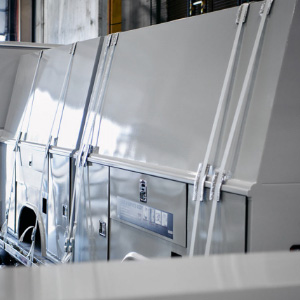Choosing diesel or gas for your truck fleet should be a serious concern for your company. This decision will make a difference in how your company will service and fuel your fleet’s trucks. Driving habits will also determine which of these types of vehicle lasts longer than the other. To make an informed decision about which option you want to power your fleet’s vehicles, learn the differences between diesel vs. gas engines and how they affect the rest of the trucks’ capabilities.
What’s the Difference Between Diesel and Gas?
When looking at fleet vehicles, you will see both diesel and gasoline options, especially for trucks. Don’t lean on myths to make your decision. Diesel trucks aren’t always more fuel-efficient than gasoline vehicles, nor are gas-fueled always cheaper to purchase. Understanding the fundamental differences between the two will help you to decide whether diesel is better than gas for your fleet.
How Diesel Engines Work
Diesel engines set themselves apart from those run on gasoline in their combustion cycles. Both gasoline and diesel engines run through a series of cycles — intake, compression, ignition and exhaust. During intake, a diesel engine draws air into the combustion chamber. The piston pushes the air to heat it more through pressure. When the fuel injectors send diesel into the combustion chamber, it ignites when it contacts the heated air. This ignition creates the power used to move the piston back down and to turn the crankshaft in the engine. The exhaust step happens last when the gas from the burning leaves the combustion chamber.
Because the engines differ significantly from gasoline options, purchasing a diesel truck costs more. In 2015, the average diesel vehicle used for government fleets cost $8,000 more than its gasoline counterpart, whereas 15 years prior, the difference was only $3,000. Cost differences to purchase diesel trucks mean the other benefits of diesel over gasoline must justify the higher purchase price.
The means diesel engines run through the strokes of the motor affects multiple abilities of the truck. Diesel burning directly affects fuel efficiency, torque, horsepower, towing power and vehicle longevity. Understanding how a diesel engine operates will help you recognize how this fuel source impacts the type of trucks you choose for your fleet.
Diesel engines have construction to match their heavy-duty operation. Because the workings of diesel trucks are so durable, these vehicles last longer and have a higher resale value compared to gasoline trucks. If you plan to use your fleet vehicles for a short time and sell them before purchasing new trucks, consider diesel, which offers a better investment for selling later.
How Gasoline Motors Operate
Gasoline engines have a similar operation to diesel. The most significant difference between the two is the need for spark plugs for gasoline engines. During intake, both gas and air enter the combustion chamber where a piston pushes the air into a compressed state. Each combustion cylinder has a spark plug that ignites to light the gas in the chamber and start the power cycle. Just as in a diesel engine, the exhaust gases leave the chamber after the power stroke.
While gasoline trucks don’t have the same longevity as diesel, how much will it matter to your fleet? Why buy trucks with extra-long lives you won’t get to use? Many government fleets replace their trucks after a decade when the vehicles have 125,000 miles on them.
If you plan to replace the vehicles regularly, the lower price of gasoline trucks may make them a better purchase for your company even though these trucks have lower resale values. You can affect the resale value by taking care of your fleet’s gasoline trucks and adding quality components to customize the vehicle, such as truck bodies to improve utility.
Just as the structure of diesel engines affects several factors of their operation, gasoline also impacts how the trucks using it run. Most drivers feel more comfortable with gas as it’s the standard for many passenger cars. How you will use your fleet vehicles will determine whether you need the standby of gasoline or if you need to spend the extra money on diesel trucks.
Gas vs. Diesel: Fuel Efficiency
The fuel efficiency comes first to mind when choosing a major engine type for your fleet. When comparing diesel vs. gas mpg, diesel comes out on top. Each gallon of diesel fuel will increase mileage for your truck 20 to 35% over a similarly sized vehicle that runs on gasoline. Diesel offers much better efficiency when used in a truck than gas.
How diesel runs more efficiently relates to its ability to run an engine in extremely lean air-to-fuel ratios. With these higher proportions of air to fuel, the motor has a higher percentage of air in the combustion chamber compared to fuel. Gasoline engines average 14.7 parts air to 1 part fuel. Typical ratios are between 12 and 18 parts air to 1 part gas.
Diesel, however, operates with a much wider range of air-to-fuel proportions, 18 to 1 all the way to 70 to 1. For diesel engines, pressing the accelerator injects more fuel into the combustion chambers, lowering the air-to-fuel ratio. Because diesel engines do not have as narrow a range of proportions for air-to-fuel as those that run on gas, you get more mileage out of every gallon of diesel.
Diesel engines can run so lean partially due to the thickness of diesel. Unlike thin, liquid gasoline, diesel has a more viscous texture, more like syrup. Another way to think of the extra mileage per gallon you get from diesel is that this fuel has higher potential energy than gasoline.
Though buying a diesel truck often costs more than a gasoline vehicle, the lower prices for diesel and the improved fuel mileage will help recover the cost difference. If you plan on keeping your fleet vehicles for a long time, diesel will be the better option because you likely won’t see the higher price for your diesel vehicles recouped in fuel savings until the trucks reach 150,000 miles. The good news is your diesel trucks with this many miles on them can get a higher resale price compared to gasoline trucks with similarly high mileage.
When looking at fuel efficiency, intake into the engine of gas or diesel only accounts for half the equation. You must also consider the output from the combustion, also called the exhaust. For every gallon of diesel used, the engine produces an average of 22.4 pounds of carbon dioxide. Compare this to gasoline’s output of 19.6 pounds of carbon dioxide per gallon. While at first glance, it appears diesel loses the battle in this arena, remember that you need less diesel fuel. The higher fuel efficiency for a minor increase in carbon dioxide output still puts diesel ahead of gasoline.
If the only factor you consider when choosing trucks for your fleet is fuel economy, diesel would be your answer. However, other aspects of your fleet’s capabilities should come into play when making the decision. The fuel source for your fleet will affect the torque, towing power and maintenance of all the trucks you have. You cannot look at only one of these aspects to make your decision.
Gas vs. Diesel: Torque/Horsepower
The torque determines how well the engine pushes the vehicle forward from a stop. Compared to gasoline engines, those that use diesel have better low-end torque, allowing for better forward movement from a standstill — torque factors into towing capabilities. The more torque an engine has, the better it can haul a load.
Again, like other advantages of diesel engines, more low-end torque comes from how the engine operates. The addition of diesel fuel to the combustion chamber starts the ignition phase, which happens after the piston moves deeply enough into the cylinder to compress the air to a hot enough temperature to ignite. The more the piston moves in, the farther it can move out after ignition. This distance contributes to the higher torque from a diesel engine.
Modern diesel vehicles also have more power than their older counterparts. Despite improvements in power output of diesel engines, their horsepower still lags behind the production of gasoline-fueled motors. Today’s gasoline trucks have approximately 25 more horsepower than diesel vehicles. This close difference showcases the strides diesel vehicle manufacturers have made because, at one point, diesel engines had 50 horsepower less than gasoline motors.
Horsepower gives a vehicle more exceptional acceleration capabilities once it’s driving. If your fleet trucks need the extra ability to pass slower traffic on the road, having greater horsepower will help. Since drivers rarely need high horsepower outside the race track, though, you don’t need to worry about this statistic as much as other data about the truck. In most cases the only required extra power for towing is torque.
When it comes to torque versus horsepower, you need to decide whether you need your vehicle to reach higher speeds or to have faster acceleration and towing capabilities. Many fleet trucks do not need to haul, only to carry their equipment. Just as other equipment your workers use, fleet vehicles need to match their application.
If you don’t need the additional low-end torque of a diesel engine, gasoline trucks may be a better, lower-cost option. Whether your vehicles will tow or haul cargo will play a part in deciding if you need extra torque.
Gas vs. Diesel: Towing Power
When it comes to towing, diesel trucks surpass gasoline vehicles in power, but the extra hauling capabilities come at a higher price. How many trucks in your fleet need to tow or haul equipment? If you don’t need all fleet vehicles for towing, don’t choose all diesel trucks. Instead, dedicate diesel trucks for hauling, which these vehicles have a better design for.
If you require a lot of towing power from your fleet, choose diesel. The extra torque the engine generates makes towing easier because the vehicle can move itself and its cargo more easily from a standstill, which is called low-power torque. Horsepower only helps if your fleet vehicles must pass when towing. When comparing statistics across several options you want for your fleet, choose those with higher torques for better towing. Even if these trucks have lower horsepower ratings, the higher torque will make them more adept at hauling.
So, how much towing power do you need? More substantial towing jobs require engines with more massive displacements. Go for trucks with more significant diesel engines if your fleet requires regular towing or trailering. Occasional use of a vehicle powered by gasoline to tow won’t harm your business. However, using a gas truck to tow too often overstresses the engine, reducing its fuel mileage and longevity.
Gas vs. Diesel: Maintenance
Regardless of the type of trucks you choose for your fleet, you will still need to maintain them. Consider both preventative maintenance services such as oil and filter changes and repairs like replacing clogged or non-functioning fuel injectors.
Gasoline engines tend to be smaller than diesel, and as such, they require less oil at each oil change. Over time, the total cost for just the engine oil will be higher for diesel vehicles. In addition to needing more oil, diesel engines require more frequent filter changes, and some have water separators that also need replacing. The greater complexity of diesel engines will increase their costs for preventative maintenance by requiring service more often than gasoline trucks.
The engine’s durability and longer intervals between repairs give diesel trucks an advantage for maintenance. While the parts cost more, you will not need to make as many repairs to the vehicle as a gasoline engine. Whether this balances out the more frequent services and higher part costs depends on how your workers drive their fleet vehicles. Aggressive driving habits can wear down a truck and its engine faster, increasing the number of repairs needed.
The lifespan of your trucks will also make a difference. How long will you need to perform maintenance and make repairs on a fleet vehicle until it no longer functions? For gasoline vehicles, design life takes them to 200,000 miles, but diesel engines have a design to last 310,000 miles.
Why do diesel engines need more care but last longer? These motors build up higher pressures compared to gasoline motors. To withstand the extra force, the diesel engine has more durable parts and more complex design. One benefit of maintaining diesel trucks comes in never needing to replace spark plugs because these engines don’t use them, favoring compression to create the heat for ignition.
Making Choices for Your Truck Fleet
While one of the most important decisions you can make for your fleet is the choice of diesel vs. gas trucks, another is how you will use those vehicles. By integrating truck bodies onto your vehicles’ exteriors, you will improve your fleet’s productivity. Bodies come in a wide range of styles to suit your company’s needs — service, dump, mechanic, landscape, enclosed and customized. Contact us for information on our fleet solutions that fit both gasoline and diesel trucks.




